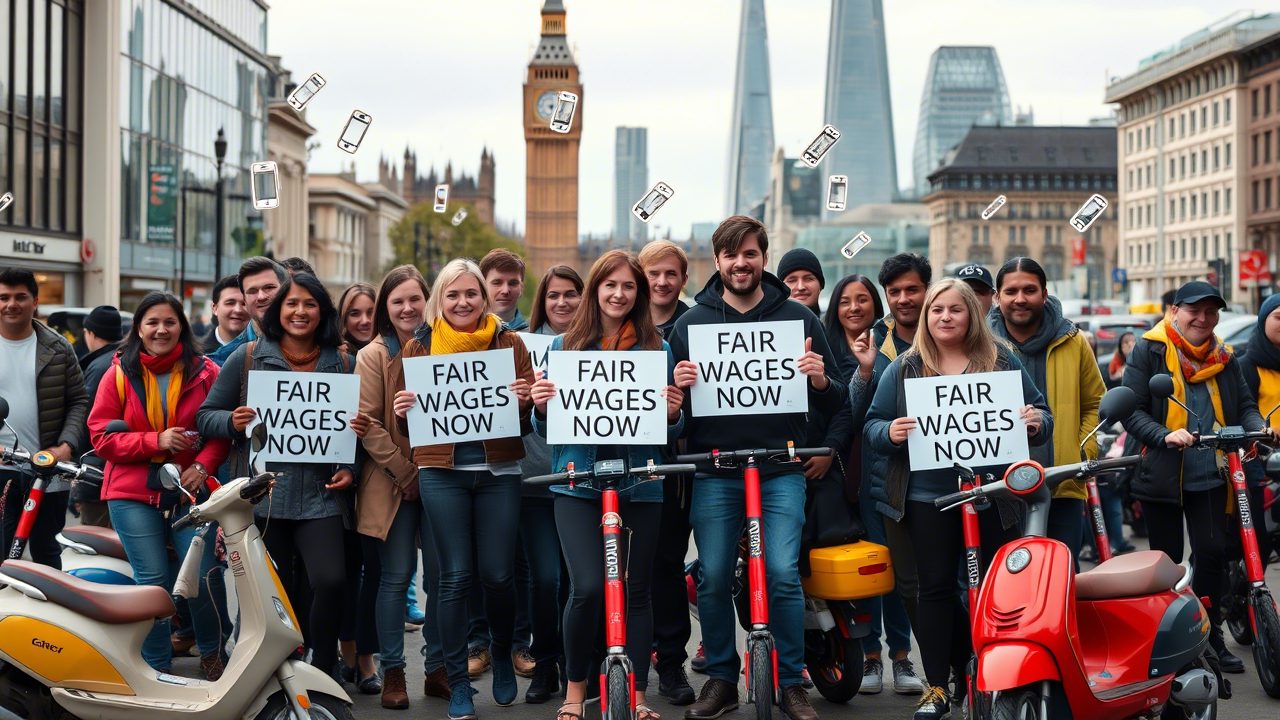The Human Cost of the Gig Economy: Stories from British Workers
Imagine this: it’s 3 a.m., and you’re sitting in your car, parked under the flickering neon sign of a 24-hour petrol station on the outskirts of Manchester. The air is damp, carrying the faint scent of diesel fumes mixed with the chill of a late autumn night. Your phone buzzes—a new ride request flashes across the screen. You glance at it, sigh deeply, and tap “accept.” Another fare, another stretch of tarmac to navigate, another stranger whose life briefly intersects with yours before vanishing without a trace.

The passenger climbs into the backseat, their face illuminated by the cold blue glow of their smartphone as they scroll through TikTok videos. They don’t say hello, don’t acknowledge your presence beyond a muttered destination. For the next ten minutes, you weave through rain-slicked streets, dodging puddles and potholes, while the hum of tires on wet asphalt fills the silence between you. When they finally exit near Piccadilly Gardens, their parting gesture isn’t a word of thanks but an indifferent grunt as they slam the door shut. Welcome to the gig economy—a world where freedom often feels like captivity, autonomy masquerades as exploitation, and dreams of entrepreneurship dissolve into the cold reality of algorithmic servitude.
Thrilling, Tragic, Thought-Provoking: The Dual Faces of the Gig Economy
As we peel back the layers of this modern phenomenon, prepare to embark on a journey that is equal parts thrilling, tragic, and thought-provoking. Thrilling because it reveals the ingenuity and resilience of ordinary people finding ways to survive—and sometimes thrive—in extraordinary circumstances. Tragic because it lays bare the human cost of unchecked capitalism, where dreams are crushed under the weight of algorithmic indifference. And thought-provoking because it challenges us to reimagine what work should look like in the 21st century.
From the gritty underbelly of corporate greed—where tech giants rake in billions while skirting responsibility for their workforce—to the inspiring resilience of workers fighting for dignity, this article will take you behind the scenes of the gig economy. We’ll meet drivers organising protests outside Parliament Square, couriers forming cooperatives in Bristol, and freelancers advocating for fairer policies in Edinburgh. Through their stories, we’ll see glimpses of hope amidst despair, acts of rebellion against systemic injustice.
Questioning the Future We’re Building Together
Ultimately, this narrative leaves readers questioning what kind of future we’re building together. Will we allow the gig economy to perpetuate cycles of precarity and disenfranchisement, or will we harness its potential to create something more equitable and humane? As Britain navigates post-Brexit uncertainties and debates over workers’ rights, these questions take on added urgency.

By framing the gig economy within the context of British culture and geography, we ground its complexities in relatable, tangible terms. Whether it’s the flickering neon sign of a petrol station in Leeds or the rain-soaked streets of Liverpool, these details remind us that behind every app notification is a person with hopes, fears, and aspirations. And as we reflect on their struggles, we’re invited to consider our own role in shaping a fairer, more compassionate society.
After all, the gig economy isn’t just a story about work—it’s a mirror reflecting who we are and who we want to become.
Themes Embedded in the Narrative: Freedom vs. Captivity
The gig economy has been marketed as a revolutionary force, promising Britons the kind of freedom that resonates deeply with national ideals of self-determination and entrepreneurial spirit. In theory, it offers workers the ability to choose their hours, set their own schedules, and break free from the rigid hierarchies of traditional employment. For many, this vision is intoxicating—a chance to reclaim control over one’s time and destiny, whether they’re ferrying passengers through London’s labyrinthine streets or delivering meals across Edinburgh’s historic districts.

However, as our opening scene so vividly illustrates, this promise of freedom often unravels under scrutiny, revealing instead a form of captivity far more insidious than any nine-to-five office job. Beneath the glossy veneer of autonomy lies a system designed not to liberate but to ensnare, leaving workers tethered—literally and figuratively—to their smartphones, beholden to algorithms that dictate every aspect of their working lives.
The Illusion of Choice
In Britain, where notions of personal liberty are deeply ingrained in cultural identity—from Magna Carta to modern debates about Brexit—the idea of choosing when and how much to work holds undeniable appeal. Yet, for gig workers, this “choice” is anything but genuine. While platforms like Uber, Deliveroo, and Bolt tout flexibility as their hallmark, the reality is that workers face immense pressure to remain perpetually available. Declining too many jobs risks penalties: reduced visibility on the app, lower rankings, or even outright deactivation.
Consider a courier in Birmingham who logs off after a long day only to find fewer opportunities the next morning because the algorithm has deprioritised them. Or a driver in Leeds who hesitates to reject poorly paid fares during rush hour, knowing that doing so could jeopardise future earnings. What begins as voluntary participation quickly devolves into compulsive activity, driven by the fear of falling behind in an increasingly competitive marketplace. This dynamic transforms what was once framed as liberation into servitude, where the illusion of choice masks a profound lack of agency.
Algorithmic Overlords: The New Taskmasters
Central to this paradox is the role of algorithms—those omnipresent yet invisible arbiters of modern work. These digital systems operate with cold efficiency, dictating everything from pay rates to performance evaluations. A driver might complete dozens of trips flawlessly, only to see their rating plummet after a single negative review. Similarly, couriers may find themselves penalised for factors beyond their control—traffic delays caused by roadworks near Westminster, bad weather sweeping across the Pennines, or even customer errors such as entering incorrect addresses.

Such algorithmic oversight strips away the dignity of labour, reducing workers to mere data points in a vast, impersonal machine. In a country historically proud of its trade unions and workers’ rights movements, this erosion of bargaining power feels particularly jarring. Where once collective action could challenge exploitative practices, gig workers now face an adversary that cannot be negotiated with or appealed to—a faceless code that prioritises profit margins over people.
Cycles of Dependency and Precarity
Perhaps the most insidious aspect of the gig economy is its ability to foster dependency while offering no safety net. Unlike traditional employees, gig workers are classified as independent contractors, meaning they receive no benefits such as sick pay, holiday entitlement, or pension contributions. This classification forces them to shoulder all the risks associated with their work, from fluctuating demand to rising fuel costs.
Moreover, the precarious nature of gig work makes long-term planning nearly impossible. One month, a courier might earn enough to cover rent and bills; the next, dwindling orders leave them struggling to make ends meet. This financial instability creates a cycle of dependency, where workers feel compelled to stay on the platform despite its shortcomings simply because there are few viable alternatives. It’s a form of economic bondage cloaked in the language of empowerment—a bitter irony that would not be out of place in a Dickensian novel.

Take, for example, a single parent in Newcastle relying on late-night deliveries to supplement their income. They log onto the app at midnight, hoping to secure a few extra pounds before bed, only to discover that peak hours have passed and payouts are minimal. Despite the exhaustion, they persist, knowing that stepping away entirely could mean losing access to the platform altogether. What was sold as a pathway to independence becomes a trap, forcing individuals to sacrifice health, family time, and personal well-being just to survive.
A Clash of Ideals
Ultimately, the tension between freedom and captivity highlights a fundamental clash of ideals within the gig economy. On one side stands the neoliberal ethos of self-reliance and entrepreneurial spirit—a philosophy that resonates strongly in post-Thatcherite Britain. On the other side lies a growing recognition of the social contract, the understanding that work should provide not just income but also security, respect, and a sense of belonging.
This dichotomy plays out daily across the UK. In cities like Manchester and Bristol, grassroots movements led by gig workers are challenging the status quo, demanding fair wages, better protections, and greater transparency from tech giants. Meanwhile, policymakers in Westminster grapple with how to regulate these platforms without stifling innovation. The debate extends beyond economics, touching on broader questions about what kind of society we wish to build—one that values efficiency above all else, or one that prioritises human dignity and solidarity.
Freedom Reimagined
To truly address the contradictions embedded in the gig economy, we must reimagine what freedom means in the context of modern work. True liberation would involve granting gig workers the same rights and protections afforded to traditional employees, ensuring they can thrive without sacrificing stability or self-respect. It would mean designing algorithms that prioritise fairness over profit, fostering environments where workers feel valued rather than expendable.
As we reflect on this theme, let us remember that the struggle for meaningful work is not new—it echoes throughout British history, from the Luddites smashing looms in protest against mechanisation to the suffragettes fighting for women’s right to participate fully in public life. Today, gig workers stand on the frontlines of another battle for justice, reminding us that progress must always be measured not by technological advancement alone but by its impact on human lives.
By examining these contradictions through the lens of British culture and history, we gain a richer understanding of why the gig economy’s promise of freedom rings hollow for so many. And perhaps, in doing so, we take the first step toward forging a path forward—one that honours both innovation and integrity.
Dreams vs. Reality: The Gig Economy’s Broken Promises
The allure of the gig economy is undeniable, particularly in a nation like Britain, where the spirit of entrepreneurship and self-reliance has long been celebrated. From the industrial titans of the Victorian era to the tech startups dotting Shoreditch today, the idea of forging one’s own path holds a special place in the British psyche. For many who enter the gig economy, it begins with dreams of financial independence, creative fulfillment, or simply the freedom to be their own boss. They imagine themselves as modern-day pioneers, navigating the uncharted waters of a rapidly evolving labour market, armed with nothing but determination and a smartphone.
Yet, as countless workers across the UK have discovered, these aspirations often collide head-on with harsh realities. What starts as a hopeful venture into entrepreneurship quickly devolves into a grind marked by long hours, meager pay, and an overwhelming sense of disillusionment. The dream of self-determination gives way to the cold logic of algorithmic servitude—a world where success depends less on skill or effort and more on pleasing faceless systems that prioritise efficiency over humanity.
The Dream: Entrepreneurship and Autonomy
For some, the gig economy represents the ultimate expression of autonomy. Take Sarah, a former retail worker from Leeds, who left her part-time job at a high-street chain to become a full-time Deliveroo rider. She envisioned herself setting her own schedule, earning decent money during peak hours, and having the flexibility to care for her young children. Or consider James, a graphic designer in Brighton, who turned to freelance platforms like Fiverr and Upwork, hoping to build a portfolio of clients while pursuing his passion for illustration.
These stories are emblematic of the hopes that draw people into the gig economy. Many see it as an escape from the monotony of traditional employment—a chance to reclaim control over their time and destiny. In a country grappling with stagnant wages, rising living costs, and dwindling opportunities in certain sectors, the gig economy offers a tantalising promise: you can make it on your own terms.
The Reality: Survival Over Success
But the gap between dreams and reality is vast. Sarah soon realised that being her “own boss” meant shouldering all the risks without any of the rewards. Her earnings fluctuated wildly depending on demand, weather conditions, and even changes to Deliveroo’s payment structure. On slow days, she found herself working 12-hour shifts just to break even, leaving little time for her family. Meanwhile, James discovered that competition on freelance platforms was fierce, with clients often opting for the lowest bidder regardless of quality. To secure work, he had to slash his rates, eroding both his income and his sense of professional pride.
This pattern repeats itself across the UK. Drivers in Manchester slog through rush-hour traffic only to find that their take-home pay barely covers fuel and maintenance costs. Couriers in Glasgow brave freezing winters and torrential rains, yet struggle to afford basic necessities like rent and groceries. Freelancers in London spend hours crafting pitches and proposals, only to be ghosted by potential clients or undercut by cheaper competitors abroad.
What these workers encounter is not the empowering journey they envisioned but a brutal cycle of survival. Instead of thriving as entrepreneurs, they find themselves trapped in low-wage, precarious labour—working longer hours for less reward than they might have earned in conventional jobs.
Algorithmic Servitude: The Faceless Gatekeeper
At the heart of this disillusionment lies the omnipresent algorithm—the unseen force that governs every aspect of gig work. Unlike traditional employers, who might recognise individual merit or loyalty, algorithms operate according to rigid metrics that leave no room for nuance. A driver in Birmingham could complete dozens of flawless trips, only to see their rating drop after a single negative review. A courier in Cardiff might lose access to prime delivery zones because they missed logging in during peak hours due to unforeseen circumstances.

Success in the gig economy hinges not on talent, experience, or hard work but on one’s ability to game the system. Workers must constantly adapt to ever-changing rules, optimise their performance to appease the algorithm, and compete against others in a race to the bottom. This relentless pressure strips away the romance of entrepreneurship, replacing it with a grim calculus of survival.
A Clash of Aspirations and Outcomes
The disparity between dreams and reality underscores a broader cultural tension in Britain—a clash between aspiration and outcome. The gig economy taps into deeply ingrained ideals of self-reliance and upward mobility, promising individuals the tools to carve out better lives for themselves. Yet, it simultaneously exposes the fragility of those dreams when faced with structural inequalities and exploitative practices.
Consider the case of migrant workers in cities like London and Birmingham, who turn to gig platforms as a means of supporting themselves and their families back home. Their initial optimism—fuelled by visions of sending remittances and building brighter futures—is frequently dashed by the harsh realities of low pay, lack of benefits, and social isolation. Similarly, young graduates entering the workforce amidst a cost-of-living crisis may view gig work as a stepping stone to something greater, only to find themselves stuck in a dead-end cycle of precarity.
Reimagining the Dream
To bridge the chasm between dreams and reality, we must fundamentally rethink how the gig economy operates. True empowerment would involve granting workers greater agency—not just over their schedules but over the systems that govern their livelihoods. This could include transparent algorithms, fairer payment structures, and collective bargaining rights that allow gig workers to advocate for themselves collectively.
Moreover, society must challenge the myth that gig work equates to entrepreneurship. While some may thrive in this environment, the majority do not. Policymakers, businesses, and communities must work together to create pathways to stable, meaningful employment for all. Whether through retraining programs, cooperatively owned platforms, or stronger labour protections, there are ways to ensure that the dream of self-determination does not come at the expense of dignity and security.
A Nation Divided by Dreams
Ultimately, the story of dreams versus reality in the gig economy reflects a nation divided by aspiration and outcome. On one hand, Britain remains a land of opportunity, where individuals are encouraged to chase their ambitions and forge their own paths. On the other hand, it is a place where systemic inequities and corporate greed often conspire to dash those very same dreams.
As we reflect on this theme, let us remember that the struggle for meaningful work is not unique to the gig economy—it echoes throughout history, from the factory floors of the Industrial Revolution to the union halls of the 20th century. Today, gig workers stand at the forefront of another pivotal moment, challenging us to reimagine what work should look like in the 21st century. By addressing the broken promises of the gig economy, we take a step toward building a future where dreams and reality align—a future where everyone has the chance to succeed, not merely survive.
The Allure of Freedom: Why Millions Flock to the Gig Economy
In a nation like Britain, where individual liberty and self-determination are deeply ingrained cultural values, it’s no surprise that millions have been lured into the gig economy by promises of flexibility, independence, and the tantalising prospect of being their own boss. These ideals resonate powerfully in a society that prides itself on personal agency—from the entrepreneurial spirit of Victorian industrialists to the modern-day hustle culture celebrated on social media. For many, gig work represents not just a job but an opportunity to reclaim control over their time, escape the drudgery of traditional employment, and forge a path uniquely their own.
Yet beneath the glossy marketing campaigns and aspirational slogans lies a darker truth—one that reveals how seductive yet deceptive these narratives can be. While platforms like Uber, Deliveroo, and TaskRabbit tout freedom as their cornerstone, the reality for workers often involves strings attached, hidden compromises, and systemic pressures that undermine the very autonomy they promise.
Flexibility: The Double-Edged Sword
At first glance, the appeal of flexibility is undeniable. Imagine setting your own hours, deciding when to log on or off, and structuring your day around personal commitments rather than rigid corporate timetables. This is particularly attractive in a country grappling with rising living costs, stagnant wages, and increasingly precarious employment conditions. A single parent in Birmingham might see gig work as a way to balance childcare with earning an income. A student in Manchester could use evenings and weekends to supplement their studies without committing to a full-time role. And retirees in Cornwall might view it as a means to stay active while generating extra cash.
Real-world examples abound. Take Sarah, a former retail assistant from Leeds who joined Uber Eats after her shop closed during the pandemic. She loved the idea of choosing her shifts and working only when she felt up to it. Or James, a freelance graphic designer in Bristol, who turned to Fiverr hoping to build a client base while pursuing his passion projects. Both were drawn to the promise of “work when you want, earn what you need”—a phrase immortalised in Uber’s early advertising campaigns.
But this flexibility comes at a cost. Workers quickly discover that logging off too often results in reduced visibility on the platform, lower rankings, or even penalties. Algorithms prioritise those who remain perpetually available, creating a perverse incentive to accept every task regardless of pay or convenience. What starts as voluntary participation soon morphs into compulsive activity, driven by the fear of losing access to future opportunities. Flexibility, then, becomes a double-edged sword—a tantalising illusion that masks the relentless grind required to make ends meet.
Independence: The Myth of Being Your Own Boss
Another pillar of the gig economy’s allure is the promise of independence—the chance to break free from micromanagement and corporate hierarchies. Who wouldn’t want to answer to themselves rather than a demanding supervisor? This narrative taps into a distinctly British ideal of self-reliance, echoing the entrepreneurial ethos championed by figures like Margaret Thatcher, who famously declared, “There is no such thing as society.”

However, the reality falls far short of this romanticised vision. Instead of being their own bosses, gig workers find themselves beholden to faceless algorithms that dictate everything from pay rates to performance evaluations. Consider a courier in Glasgow whose earnings plummet because the app suddenly reduces delivery fees during peak hours. Or a driver in London penalised for rejecting poorly paid rides, despite having valid reasons like traffic congestion or vehicle maintenance issues. In these scenarios, the worker has little recourse—no HR department to appeal to, no union rep to advocate for them, and certainly no human manager willing to listen.
This dynamic exposes the hollowness of the “be your own boss” mantra. True independence would involve genuine control over one’s working conditions, fair compensation, and the ability to negotiate terms. Instead, gig workers operate within tightly controlled ecosystems designed to maximise corporate profits at their expense. Far from empowering individuals, these systems strip away autonomy, leaving workers trapped in cycles of dependency.
The Seductive Language of Marketing
Much of the gig economy’s success hinges on its masterful use of language and imagery. Platforms like Uber and Deliveroo craft narratives that position gig work as a lifestyle choice rather than a form of labour. Phrases like “drive when you want, earn what you need” paint a picture of effortless prosperity, suggesting that anyone can achieve financial stability simply by logging onto the app. Advertisements feature smiling drivers cruising through picturesque streets or couriers cycling past iconic landmarks like Tower Bridge or Edinburgh Castle, reinforcing the idea that gig work is not just a job but an adventure.
These narratives are seductive precisely because they tap into universal desires for freedom and self-determination. Yet, they gloss over the harsh realities faced by most workers. For every success story of someone earning a decent living through gig work, there are countless others struggling to survive. A report by the Trades Union Congress (TUC) found that nearly half of all gig workers in the UK earn less than the minimum wage once expenses are accounted for. Meanwhile, research from the University of Hertfordshire revealed that many gig workers experience high levels of stress, anxiety, and burnout due to unpredictable incomes and lack of protections.
A Nation Grappling with Precarity
The allure of the gig economy must also be understood within the broader context of economic precarity in Britain. With inflation soaring, housing costs skyrocketing, and public services stretched thin, many turn to gig work out of necessity rather than choice. Young people entering the workforce amidst a cost-of-living crisis may see it as a temporary solution, only to find themselves stuck in a cycle of low pay and insecurity. Migrant workers, drawn to cities like London and Birmingham by promises of opportunity, often end up relying on gig platforms to support themselves and their families back home.

This widespread reliance on gig work highlights a troubling paradox: while it offers a lifeline for some, it perpetuates systemic inequalities for others. Those already marginalised—whether by socioeconomic status, race, gender, or immigration status—are disproportionately affected by the gig economy’s exploitative practices. For instance, a Bangladeshi delivery rider in East London might endure gruelling hours in hazardous conditions, knowing that speaking out could jeopardise his visa status. Similarly, a Black cab driver forced to compete with Uber’s cheaper fares might struggle to cover rising insurance premiums and fuel costs.
Unpacking the Deception
To truly understand why so many flock to the gig economy, we must unpack the deception embedded in its marketing. The promises of flexibility, independence, and entrepreneurship are not inherently false—they simply apply to a privileged few while masking the struggles of the majority. By framing gig work as a pathway to empowerment, companies deflect attention from the structural inequities that underpin their business models.
As we delve deeper into this theme, let us challenge ourselves to look beyond the glossy veneer and confront the uncomfortable truths beneath. Only then can we begin to reimagine a system that honours the dignity of labour and ensures that freedom is more than just a buzzword—it’s a lived reality for all.
The Algorithmic Overlord: How Technology Controls Workers
In the gig economy, algorithms reign supreme. These invisible yet omnipresent systems govern every aspect of a worker’s life—from determining pay rates and assigning tasks to evaluating performance and deciding who gets access to the best opportunities. While technology is often hailed as a force for progress and efficiency, in the context of gig work, it takes on a more sinister role. Algorithms act as unyielding overlords, reducing workers to mere data points and subjecting them to relentless surveillance and control.

For gig workers across the UK, this technological dominance is not just an inconvenience—it’s a fundamental reshaping of what it means to work. Whether you’re a Deliveroo rider navigating the streets of Manchester or an Uber driver stuck in London traffic, your livelihood depends on pleasing an algorithm that operates with cold logic, devoid of empathy or nuance. As we delve deeper into this theme, we’ll explore how these digital systems dictate behaviour, enforce compliance, and penalise those who dare to step out of line.
The Mechanics of Control: Pay Rates and Task Allocation
At the heart of the gig economy’s algorithmic control lies its ability to determine how much workers earn and which jobs they receive. Platforms like DoorDash and Instacart use complex formulas to calculate pay based on factors such as distance, time, demand, and even customer ratings. However, these calculations are often opaque, leaving workers in the dark about how their earnings are calculated.
Take, for example, a study conducted by researchers at the University of California, Berkeley, which analysed payment structures on DoorDash. It revealed that tips from customers were frequently factored into base pay, effectively subsidising the company’s costs while misleading both workers and consumers. Similar patterns have been observed in the UK, where couriers report fluctuations in pay rates depending on peak hours, location, and platform policies. One Deliveroo rider in Birmingham described how his hourly rate dropped dramatically during slower periods, forcing him to work longer hours just to make ends meet.
Task allocation further reinforces this control. Algorithms prioritise certain workers over others based on metrics like acceptance rates, completion times, and overall activity levels. A courier in Glasgow might find herself excluded from lucrative delivery zones if she declines too many orders, even if her reasons are valid—such as inclement weather or vehicle issues. This creates a culture of compliance, where workers feel compelled to accept every task regardless of fairness or feasibility.
Performance Evaluations: The Ratings Game
Another critical way algorithms exert control is through performance evaluations. On platforms like Uber and Bolt, drivers’ futures hinge on their ratings—a numerical score determined by customer feedback. While this system purports to ensure quality service, it places immense pressure on workers to cater to passengers’ whims, no matter how unreasonable.
Consider a scenario familiar to many gig workers: a passenger leaves a low rating because the driver refused to exceed speed limits or take unsafe shortcuts. Or worse, a rider docks stars simply because they disliked the music playing in the car. Such arbitrary judgments can have devastating consequences. Drivers risk being deactivated—or “de-platformed”—if their ratings fall below a certain threshold. This fear of losing access to the app forces workers to prioritise appeasing customers over asserting their rights or maintaining professional boundaries.
A study by the Oxford Internet Institute highlighted how precarious this ratings-based system is, particularly for minority workers. For instance, Black drivers in London reported receiving disproportionately negative reviews compared to their white counterparts, suggesting implicit bias among users. Without recourse to appeal or explanation, these workers are left vulnerable to systemic discrimination embedded within the algorithm.
Constant Surveillance: The Panopticon of the Gig Economy
Perhaps the most chilling aspect of algorithmic control is its capacity for constant monitoring. Gig workers are tracked at all times—GPS coordinates log their movements, timers measure their efficiency, and sensors monitor everything from braking patterns to idle minutes. This level of surveillance transforms the workplace into a digital panopticon, where workers feel perpetually watched and judged.
For example, an Uber driver in Leeds recounted how the app flagged him for taking “unnecessarily long routes,” despite following recommended navigation due to road closures. Similarly, a Deliveroo rider in Bristol was penalised for spending “too much time” at drop-off locations, even though he was ensuring food was handed over safely during busy evening rushes. These incidents underscore how algorithms strip away human context, treating deviations from expected norms as punishable offences rather than understandable adjustments.
Such scrutiny extends beyond physical actions to behavioural patterns. Workers who log off during peak hours, reject poorly paid gigs, or fail to maintain high activity levels risk being deprioritised by the algorithm. This creates a perverse incentive to remain perpetually available, sacrificing rest, health, and personal time in pursuit of better rankings and higher earnings.
Penalisation for Stepping Out of Line
The penalties imposed by algorithms are swift and unforgiving. Miss a shift? Your visibility on the platform plummets. Reject too many jobs? You’re pushed to the back of the queue. Receive a string of low ratings? Deactivation looms ominously on the horizon. These consequences serve as stark reminders that stepping out of line comes at a steep cost.

Real-world examples abound. In 2021, hundreds of UK-based Uber drivers staged protests outside Parliament Square after being abruptly deactivated without clear explanations. Many claimed their accounts had been suspended due to minor infractions flagged by the algorithm, such as failing to complete a set number of trips per week or receiving one too many cancellations (even when initiated by passengers). With no avenue for appeal, these workers found themselves locked out of the very system they relied upon for survival.
Similarly, couriers working for Just Eat and Deliveroo have reported sudden drops in income after updates to the apps’ algorithms altered pay structures or shifted priority zones. One courier in Newcastle described how overnight changes left him earning less than half his usual rate, forcing him to quit entirely. Such abrupt shifts highlight the precarious nature of gig work, where stability is sacrificed at the altar of corporate profit.
A Nation Under Algorithmic Rule
To understand the broader implications of algorithmic control, we must situate it within the UK’s socio-economic landscape. Britain has long prided itself on its tradition of workers’ rights, from the Factory Acts of the 19th century to the establishment of the National Health Service. Yet, the rise of the gig economy threatens to erode these hard-won protections, replacing collective bargaining with individual subservience to faceless code.
This shift raises troubling questions about accountability. Who is responsible when an algorithm unfairly penalises a worker? Can tech companies absolve themselves of blame by claiming neutrality in their programming decisions? And what recourse do workers have when their livelihoods are dictated by systems they cannot see, let alone challenge?
As debates around regulation intensify—whether through proposed legislation like the EU’s Digital Services Act or grassroots campaigns led by unions like the Independent Workers’ Union of Great Britain (IWGB)—one thing is clear: the unchecked power of algorithms poses a significant threat to worker dignity and autonomy.
Reclaiming Humanity from the Machine
To counteract the dehumanising effects of algorithmic control, we must advocate for transparency, fairness, and accountability. Workers deserve to know how their pay is calculated, why certain decisions are made, and what criteria determine their success or failure. Moreover, platforms should provide avenues for appeal, allowing individuals to contest unjust penalties or discriminatory practices.
Ultimately, the story of the algorithmic overlord serves as a cautionary tale—a reminder that technology, while powerful, is neither neutral nor infallible. By shining a light on its darker corners, we take the first step toward reclaiming agency and ensuring that the future of work prioritises people over profits. After all, behind every data point is a human being striving to build a better life—and that humanity must never be reduced to numbers on a screen.
The Human Cost: Burnout, Isolation, and Mental Health Struggles
Behind the sleek apps and glossy marketing campaigns of the gig economy lies a deeply human story—one marked by exhaustion, isolation, and emotional strain. For drivers, couriers, and freelancers across the UK, the absence of stability, community, and recognition takes a heavy toll on mental health. While some find fleeting moments of connection or pride in their work, many more grapple with burnout, anxiety, and even depression as they navigate a system that treats them as disposable cogs rather than valued contributors.

This section delves into the emotional landscape of gig work, blending poignant anecdotes with chilling accounts of loneliness to reveal the true cost of this modern labour model. From the rain-soaked streets of Liverpool to the bustling squares of London, we’ll uncover how the lack of support and belonging leaves workers adrift in an increasingly fragmented world.
Burnout: The Relentless Grind
Gig work is often sold as a flexible alternative to traditional employment, but for many, it quickly becomes an all-consuming grind. Without guaranteed hours, benefits, or protections, workers are forced to push themselves to extremes just to make ends meet. A study by the University of Hertfordshire found that over 60% of UK gig workers reported experiencing symptoms of burnout—a state of chronic physical and emotional exhaustion caused by prolonged stress.
Take Mark, a former warehouse worker from Sheffield who turned to Uber driving after his factory closed during the pandemic. At first, he relished the idea of setting his own schedule and being outdoors. But soon, the reality set in: long hours behind the wheel, unpredictable earnings, and relentless pressure to stay active on the app left him physically drained and emotionally depleted. “I used to think I was my own boss,” he says. “But now I feel like I’m working harder than ever, with nothing to show for it.”

For couriers delivering food in cities like Manchester and Birmingham, the situation is no better. One Deliveroo rider in Leeds described how she worked 14-hour shifts during winter months, battling icy roads and biting winds, only to earn barely enough to cover her rent. “You don’t stop,” she explains. “If you do, someone else will take your spot, and you’ll lose out. It’s exhausting.”
Such stories highlight how gig work fosters a culture of overwork, where rest is seen as a luxury rather than a necessity. The constant hustle leaves little room for recovery, leading to physical ailments, sleep deprivation, and deteriorating mental health.
Isolation: The Invisible Toll
Perhaps the most insidious aspect of gig work is its isolating nature. Unlike traditional workplaces, where shared spaces foster camaraderie and mutual support, gig workers operate alone, cut off from colleagues who might otherwise provide companionship or solidarity. This isolation is compounded by the transient nature of their interactions—brief exchanges with customers or fleeting encounters with other workers at petrol stations and pickup points.
Consider Sarah, a freelance graphic designer based in Brighton. After leaving her full-time job to pursue creative projects through platforms like Fiverr, she initially enjoyed the freedom to choose her clients and set her own deadlines. But over time, the lack of regular social interaction began to weigh heavily on her. “I miss having people around me,” she admits. “Even if it was just chatting about mundane things in the office kitchen, those small moments mattered.”
For delivery riders and drivers, the sense of disconnection runs even deeper. In urban centres like London or Glasgow, where anonymity reigns supreme, these workers often go unnoticed by the very communities they serve. A courier in Edinburgh recounts how he once delivered a meal to a flat only to have the customer refuse eye contact and slam the door without so much as a “thank you.” Such experiences chip away at self-worth, reinforcing feelings of invisibility and alienation.
Research conducted by the Trades Union Congress (TUC) underscores this issue, revealing that nearly half of UK gig workers report feeling lonely or socially isolated. For those already vulnerable—such as migrants or individuals living alone—this lack of connection can exacerbate existing mental health challenges, creating a vicious cycle of despair.
Mental Health Struggles: Anxiety and Depression
The combination of burnout and isolation inevitably leads to mental health struggles, with anxiety and depression becoming alarmingly common among gig workers. A survey by Mind, a leading UK mental health charity, found that gig workers were twice as likely to experience poor mental health compared to those in traditional roles. Factors such as financial insecurity, algorithmic control, and societal stigma contribute to this crisis.
In Newcastle, a TaskRabbit handyman named James describes how the unpredictability of gig work triggered severe anxiety. “You never know when the next job is coming or how much you’ll earn,” he says. “It’s like walking a tightrope without a safety net.” Similarly, a DoorDash courier in Cardiff shares how negative reviews sent her spiralling into depression. “One bad comment feels like the end of the world because your livelihood depends on it,” she explains.
These struggles are further compounded by the lack of access to mental health resources. As independent contractors, gig workers are not entitled to employer-provided counselling services or sick pay, leaving them to fend for themselves during difficult times. Some turn to online forums or WhatsApp groups to share their frustrations and seek advice, but these informal networks offer limited relief.
Heartwarming Moments Amidst the Darkness
Despite the overwhelming challenges, there are glimmers of hope—moments of human connection that remind us of our shared humanity. In Bristol, a group of Deliveroo riders formed a WhatsApp community to support each other, sharing tips on navigating tricky routes, warning about unsafe areas, and simply checking in to see how everyone was doing. “It’s nice to know you’re not completely alone,” says one member. “Sometimes, just knowing someone else understands what you’re going through makes all the difference.”
Similarly, in London, passengers occasionally go above and beyond to acknowledge their drivers’ efforts. One Uber driver recalls a particularly heartwarming moment when a passenger noticed his fatigue and insisted on buying him coffee. “It wasn’t about the money,” he says. “It was the kindness that stayed with me.”
These acts of solidarity, though rare, underscore the importance of recognising gig workers as human beings rather than faceless service providers. They also highlight the potential for change—if society chooses to value dignity and connection over convenience and efficiency.
A Nation Facing a Crisis
The mental health struggles of gig workers reflect broader societal issues in Britain today. Rising living costs, stagnant wages, and widening inequality have created fertile ground for exploitation, while austerity measures have gutted public services that might otherwise provide support. Against this backdrop, the gig economy represents both a symptom and a cause of growing precarity.
As policymakers debate reforms—from strengthening employment rights to regulating algorithms—it’s crucial to centre the voices of those most affected. Only by listening to gig workers’ experiences can we begin to address the root causes of their suffering and build a system that prioritises well-being over profit.
Reclaiming Humanity in the Gig Economy
To mitigate the human cost of gig work, we must tackle its structural flaws head-on. This includes ensuring fair pay, providing access to mental health resources, and fostering environments where workers feel seen, valued, and supported. Initiatives like cooperatively owned platforms, which give workers greater control over decision-making, offer promising alternatives to exploitative models.

Ultimately, the stories of burnout, isolation, and resilience remind us that behind every app notification is a person striving to survive—and thrive—in an uncertain world. By shining a light on their struggles, we take the first step toward reclaiming humanity from the shadows of the gig economy. After all, meaningful work isn’t just about earning a living; it’s about building connections, finding purpose, and contributing to something larger than ourselves. And that, perhaps, is the greatest antidote to the loneliness and despair wrought by this modern phenomenon.
The Myth of Entrepreneurship: Are Gig Workers Really Their Own Bosses?
Ah, the gig economy—a land of opportunity where everyone is an entrepreneur, a trailblazer, a captain of their own destiny. Or so we’re told. In this satirical yet sobering segment, we’ll peel back the layers of Silicon Valley’s glossy rhetoric to reveal the absurdity of calling someone who delivers groceries at midnight or ferries drunks home on New Year’s Eve an “independent contractor.” Spoiler alert: most gig workers aren’t running thriving businesses—they’re surviving paycheck to paycheck, clinging to the hope that tomorrow’s fares might be slightly better than today’s.
Let’s dive into the myth of entrepreneurship with a healthy dose of British wit and irony, contrasting the fantasy peddled by tech giants with the grim reality faced by workers across the UK.
The Glossy Rhetoric: “Be Your Own Boss!”
Silicon Valley loves nothing more than a good branding exercise, and what could sound sexier than empowering millions to become entrepreneurs? Platforms like Uber, Deliveroo, and TaskRabbit have mastered the art of reframing precarious labour as aspirational independence. Their marketing campaigns paint gig work as a bold adventure—a chance to break free from the shackles of traditional employment and forge your own path in the world.

Imagine the scene: a young professional in Shoreditch sips artisanal coffee while designing her freelance portfolio on Fiverr. A delivery rider in Manchester smiles as he pedals past historic landmarks, proudly declaring himself the CEO of his one-man cycling empire. An Uber driver in Birmingham beams behind the wheel, boasting about how he sets his own hours and answers to no one but himself.
It all sounds terribly inspiring—until you realise it’s mostly nonsense.
The Reality: Surviving Paycheck to Paycheck
For the vast majority of gig workers, the dream of entrepreneurship is just that—a dream. Take Sarah, a single mother in Leeds who turned to Uber Eats after losing her retail job during the pandemic. She imagined herself setting flexible hours and earning enough to support her family. Instead, she spends long nights navigating rain-slicked streets, battling rising fuel costs, and stressing over fluctuating pay rates. Far from being her own boss, Sarah feels beholden to an algorithm that penalises her for logging off too often or rejecting poorly paid orders.
Similarly, consider James, a courier in Glasgow who signed up with Deliveroo hoping to supplement his income. What started as a side hustle quickly became a full-time grind, leaving him exhausted and financially strained. Despite working 60-hour weeks, James barely scrapes together enough to cover rent and bills. When asked if he considers himself an entrepreneur, he laughs bitterly. “If delivering kebabs at 2 a.m. makes me a business owner, then I’m running the worst franchise in history.”
These stories are far from isolated. According to a report by the Trades Union Congress (TUC), nearly three-quarters of UK gig workers earn less than the minimum wage once expenses are accounted for. For many, gig work isn’t a pathway to prosperity—it’s a desperate scramble to stay afloat.
The Absurdity of “Independent Contractor” Status
One of the greatest ironies of the gig economy is its insistence on classifying workers as “independent contractors.” On paper, this label suggests autonomy and self-determination. In practice, it strips workers of basic rights and protections, leaving them vulnerable to exploitation.
Picture this: a Deliveroo rider in Bristol logs onto the app each morning, only to discover that his earnings per delivery have been slashed overnight. He has no say in these changes, no union rep to negotiate on his behalf, and certainly no boardroom table where he can voice his concerns. Yet, according to the company, he’s an independent contractor—a savvy entrepreneur charting his own course.

This doublespeak would be laughable if it weren’t so damaging. By denying workers employee status, platforms avoid providing benefits such as sick pay, holiday entitlement, or pension contributions. Meanwhile, riders and drivers shoulder all the risks associated with their work—from vehicle maintenance to insurance premiums. As one London-based Uber driver quipped, “I may not have a boss, but my car sure does—and it’s called Uber.”
Satire Meets Irony: The Gig Economy’s Greatest Hits
To truly appreciate the absurdity of the “entrepreneurship” narrative, let’s indulge in some classic British satire:
- Entrepreneurial Spirit: Sure, delivering groceries at midnight sounds glamorous—but only if you ignore the fact that you’re essentially playing Tetris with shopping bags while dodging drunk pedestrians.
- Creative Freedom: Who wouldn’t want the freedom to design their own route…as long as it aligns with GPS instructions dictated by an algorithm?
- Networking Opportunities: Forget LinkedIn; the real networking happens when you bond with other couriers over shared tales of miserly tips and rude customers at a 24-hour petrol station.
- Financial Independence: Nothing screams success like spending £50 on fuel to earn £60 in a day—all while dreaming of the elusive five-star review that will boost your ranking.
Through this lens, the gig economy’s promise of entrepreneurship begins to look less like empowerment and more like a cruel joke—one that leaves workers laughing (or crying) all the way to the bank…if they even make it there.
A Nation Divided by Illusions
The myth of entrepreneurship also reflects broader societal divides in Britain. While tech executives in Silicon Roundabout wax lyrical about innovation and disruption, workers in cities like Liverpool and Newcastle face the harsh realities of precarity and inequality. This disconnect highlights a troubling paradox: the same systems hailed as engines of progress often perpetuate systemic injustices.
Consider the case of migrant workers, who are disproportionately represented in the gig economy. Many turn to platforms like Bolt or Just Eat out of necessity, lured by promises of flexibility and fair pay. However, language barriers, discriminatory practices, and lack of legal recourse leave them particularly vulnerable to exploitation. Calling these individuals “entrepreneurs” is not just misleading—it’s insulting.
Reclaiming the Narrative
To dismantle the myth of entrepreneurship, we must challenge the narratives that sustain it. Policymakers, unions, and advocacy groups must push for reforms that recognise gig workers as employees entitled to basic rights and protections. Initiatives like cooperatively owned platforms, which allow workers to share ownership and decision-making power, offer viable alternatives to exploitative models.

At the same time, society must reframe how we view gig work—not as a glamorous pursuit but as essential labour that deserves respect and dignity. Whether it’s a courier braving snowstorms in Edinburgh or a freelancer juggling multiple projects in Brighton, these workers contribute to our communities in meaningful ways. Recognising their humanity is the first step toward building a fairer, more compassionate system.
Conclusion: The Emperor Has No Clothes
In the end, the myth of entrepreneurship in the gig economy is just that—a myth. Behind the shiny veneer of independence lies a stark reality of dependency, precarity, and disillusionment. By using humour and irony to expose this truth, we not only highlight the absurdity of current practices but also pave the way for change.
So, the next time you hear someone refer to a Deliveroo rider as an “independent contractor,” ask yourself: does this person truly embody the spirit of entrepreneurship—or are they simply trying to survive in a system rigged against them? The answer might just inspire you to demand better—for them, and for us all.
The Power Players: Who Profits from the Gig Economy?
Behind every late-night delivery, every rush-hour ride, and every freelance project completed on a shoestring budget lies a shadowy cabal of power players—tech giants and venture capitalists who have mastered the art of extracting maximum profit while shifting all the risks onto workers. These corporate titans, often headquartered in sleek glass towers or Silicon Valley enclaves, operate with ruthless efficiency, exploiting legal loopholes, dodging taxes, and sidelining labour rights to amass staggering fortunes. In this segment, we’ll shine a spotlight on these villains of our story, exposing their corrupt practices and revealing how they’ve rigged the system to ensure that the spoils of the gig economy flow upward, not outward.
The Tech Titans: Masters of Exploitation
At the heart of the gig economy are the platforms themselves—Uber, Deliveroo, Bolt, TaskRabbit, and others—that act as intermediaries between workers and consumers. While these companies present themselves as innovators revolutionising the future of work, their business models rely heavily on exploitation. By classifying workers as “independent contractors” rather than employees, they avoid providing basic protections such as sick pay, holiday entitlement, pensions, and even minimum wage guarantees.
Take Uber, for example. Despite branding itself as a technology company rather than a transport provider, Uber’s entire operation hinges on its army of drivers navigating Britain’s roads. Yet, when it comes to accountability, the company hides behind the fiction of independence. Drivers bear the costs of fuel, vehicle maintenance, insurance, and depreciation—all while earning less than £10 an hour after expenses, according to research by the University of Oxford. Meanwhile, Uber rakes in billions globally, with executives enjoying lavish salaries and stock options.

Deliveroo operates similarly, though its tactics have drawn particular scrutiny in the UK. In 2021, the company faced widespread backlash after shareholders rejected proposals to improve worker conditions during its initial public offering (IPO). Instead, Deliveroo doubled down on its commitment to precarious contracts, ensuring that couriers remained excluded from benefits enjoyed by traditional employees. This decision was celebrated by investors but condemned by unions and advocacy groups, highlighting the stark divide between corporate interests and worker welfare.
Venture Capitalists: The Puppeteers Pulling the Strings
While tech giants may be the face of the gig economy, venture capitalists (VCs) are the puppeteers pulling the strings. These financial powerhouses pour billions into startups, betting on rapid growth and eventual monopolisation of markets. Their goal? To secure astronomical returns on investment, regardless of the human cost.
Consider SoftBank, one of the largest backers of Uber and Deliveroo. Through its Vision Fund, SoftBank has funnelled tens of billions into gig economy platforms, enabling them to undercut competitors, expand aggressively, and dominate global markets. However, this flood of capital comes at a price. To satisfy investor demands for profitability, companies must cut corners—often at the expense of workers. For instance, Uber famously slashed driver pay rates in multiple cities to boost margins, leaving drivers struggling to cover rising living costs.
Moreover, VCs wield immense influence over corporate decisions, prioritising short-term gains over long-term sustainability. When profits dip or controversies arise, they pressure companies to double down on exploitative practices rather than invest in fairer systems. This dynamic ensures that workers remain disposable cogs in a machine designed to enrich a select few.
Tax Loopholes: Dodging Responsibility
One of the most egregious aspects of the gig economy’s power structure is its reliance on tax avoidance schemes. Tech giants and their investors routinely exploit legal loopholes to minimise their contributions to national treasuries, depriving governments of vital revenue needed to fund public services like healthcare, education, and infrastructure.
For example, many gig economy companies incorporate subsidiaries in low-tax jurisdictions such as Ireland, Luxembourg, or offshore tax havens. By funnelling profits through these entities, they significantly reduce their taxable income in countries where they operate. A report by the UK-based think tank TaxWatch revealed that Uber paid just £1.5 million in corporation tax between 2016 and 2020, despite generating hundreds of millions in revenue across Britain.
Similarly, Deliveroo has faced criticism for its opaque financial arrangements, which critics argue are designed to evade scrutiny and taxation. Such practices exacerbate inequality, forcing ordinary taxpayers—including gig workers themselves—to shoulder a disproportionate burden while billionaires accumulate wealth unchecked.
Labour Rights Under Siege
The relentless pursuit of profit by tech giants and venture capitalists has dire consequences for labour rights in the UK. Traditional protections enshrined in British law—such as the right to unionise, collective bargaining, and fair dismissal procedures—are rendered meaningless for gig workers classified as independent contractors. Without recourse to challenge unfair treatment, workers find themselves trapped in a cycle of precarity, unable to advocate for better conditions without risking retaliation or deactivation.
This erosion of rights is compounded by aggressive lobbying efforts. Companies like Uber and Deliveroo spend millions annually influencing policymakers to maintain the status quo. In 2020, Uber successfully overturned a landmark ruling by the UK Supreme Court, which granted drivers employee status and access to benefits. Although the court ultimately upheld the decision in favour of workers, the prolonged legal battle underscored the lengths to which corporations will go to protect their bottom line.
A Nation Grappling with Inequality
The concentration of wealth and power within the gig economy reflects broader societal inequities in Britain. As tech giants and venture capitalists reap the rewards of innovation, millions of workers struggle to make ends meet, caught in a system that prioritises shareholder value over human dignity. This disparity fuels growing resentment, particularly among younger generations grappling with stagnant wages, unaffordable housing, and dwindling opportunities.
In response, grassroots movements led by organisations like the Independent Workers’ Union of Great Britain (IWGB) and the GMB union have emerged to fight back. From protests outside Parliament Square to strikes demanding fair pay and recognition, these campaigns highlight the resilience of workers determined to reclaim agency in an increasingly hostile environment.
Exposing the Corruption
To dismantle the corrupt structures underpinning the gig economy, transparency and accountability are essential. Policymakers must close tax loopholes, impose stricter regulations on venture capital investments, and hold companies accountable for violating labour laws. Initiatives like the EU’s Digital Services Act offer promising frameworks for regulating tech giants, while domestic reforms could strengthen employment rights and ensure gig workers receive the protections they deserve.

Ultimately, exposing the true nature of the power players behind the gig economy serves as a call to action. By shining a light on their exploitative practices, we empower workers, consumers, and advocates to demand change—not just for themselves but for future generations. After all, if the gig economy is to live up to its promise of innovation and opportunity, it must first address the injustices perpetuated by those who profit most from its existence.
Unmasking the Villains
The gig economy’s power players—tech giants, venture capitalists, and their enablers—are the architects of a system built on greed and exploitation. By unmasking their corrupt practices and exposing the mechanisms that allow them to thrive at workers’ expense, we take the first step toward dismantling this unjust hierarchy. Whether through policy reform, grassroots activism, or consumer awareness, the time has come to hold these villains accountable and build a fairer, more equitable future for all.
After all, in a nation founded on principles of fairness and justice, shouldn’t everyone share in the prosperity created by their labour?
The Rebel Alliance: Grassroots Movements Fighting Back
In the face of corporate exploitation and algorithmic oppression, a new breed of heroes has emerged across Britain—grassroots movements led by gig workers who refuse to accept the status quo. These rebels are not armed with swords or shields but with placards, petitions, and collective determination. From strikes organised by app-based drivers to cooperatively owned alternatives like Stocksy, these acts of rebellion offer a glimmer of hope in an otherwise bleak landscape. By demanding fair wages, benefits, and protections, they challenge the very foundations of the gig economy and inspire others to join the fight against corporate tyranny.
Strikes and Protests: A United Front Against Exploitation
One of the most visible forms of resistance is the strike—a powerful tool that brings attention to the injustices faced by gig workers while disrupting the seamless operations of tech giants. Across the UK, app-based drivers and couriers have taken bold steps to demand better treatment, often at great personal risk.
Take, for example, the historic protests staged by Uber drivers outside Parliament Square in London. In 2021, hundreds of drivers gathered under banners emblazoned with slogans such as “We Are Workers, Not Robots” and “Fair Pay Now.” Their message was clear: they would no longer tolerate being classified as independent contractors, stripped of basic rights and protections. This coordinated effort culminated in a landmark Supreme Court ruling that granted Uber drivers employee status, entitling them to minimum wage, holiday pay, and other benefits. It was a hard-fought victory that sent shockwaves through the gig economy, proving that collective action can yield tangible results.
Similarly, Deliveroo riders in cities like Manchester, Glasgow, and Bristol have walked off the job to protest sudden pay cuts and unsafe working conditions. One particularly creative act of defiance occurred in Edinburgh, where couriers staged a “slow delivery” protest, deliberately delaying orders to highlight how arbitrary changes to payment structures impact their livelihoods. Such actions demonstrate not only the courage of these workers but also their ingenuity in finding ways to disrupt systems designed to marginalise them.
These protests go beyond financial grievances—they are about dignity and recognition. For many gig workers, standing up to corporate giants is an assertion of their humanity, a refusal to be reduced to data points or disposable cogs in a machine. As one striking driver in Birmingham poignantly stated, “We’re not asking for charity; we’re asking for respect.”
Cooperatives: Building a Fairer Future from the Ground Up
While strikes and protests target existing systems, another branch of the rebel alliance focuses on creating alternatives—cooperatively owned platforms that prioritise people over profits. These initiatives reimagine what the gig economy could look like if it were built on principles of fairness, transparency, and equity.
A shining example is Stocksy , a photographer-owned stock image platform based in Canada that has inspired creatives worldwide, including in the UK. Unlike traditional platforms like Shutterstock or Adobe Stock, which take hefty commissions while offering minimal support to contributors, Stocksy operates as a cooperative. Photographers retain full ownership of their work, receive generous royalties, and participate in decision-making processes. This model has sparked interest among British freelancers eager to reclaim control over their labour and earnings.
Closer to home, similar experiments are taking root. In Brighton, a group of couriers launched Brighton Delivery Co-op , a community-focused service that ensures fair wages, safe working conditions, and environmentally sustainable practices. By cutting out middlemen and redistributing profits equitably, this cooperative proves that innovation need not come at the expense of integrity.
Even within the ride-hailing sector, there is growing interest in cooperative models. Inspired by initiatives like The Drivers Cooperative in the US—a worker-owned alternative to Uber—British drivers are exploring ways to create their own platforms. These ventures aim to provide higher pay rates, transparent policies, and democratic governance, giving members a real voice in shaping the business. Though still in their infancy, such projects represent a radical departure from the exploitative norms of mainstream gig platforms.
Legal Battles: Challenging Corporate Power in Court
Beyond direct action, gig workers are also waging legal battles to secure their rights. The UK has become a hotspot for landmark cases challenging exploitative practices, with unions and advocacy groups playing pivotal roles in supporting workers’ claims.
The aforementioned Uber case is perhaps the most notable example. After years of litigation, drivers successfully argued that they should be classified as workers rather than independent contractors, paving the way for access to minimum wage, holiday pay, and other protections. This victory set a precedent that continues to influence similar disputes across the country.
Deliveroo riders, too, have pursued legal avenues to address grievances. In 2021, the UK’s Central Arbitration Committee ruled that Deliveroo riders could not be considered workers due to the company’s insistence on their contractor status. However, the decision galvanised further activism, prompting calls for legislative reform to close loopholes exploited by gig platforms.
These legal challenges underscore a crucial point: when workers unite and are supported by robust advocacy networks, they can hold even the largest corporations accountable. Each courtroom win strengthens the broader movement, sending a clear message that exploitation will not go unchallenged.
Community Support and Awareness Campaigns
Grassroots movements rely heavily on public awareness and solidarity. Across the UK, consumers are increasingly recognising the human cost behind their late-night Deliveroo orders and rush-hour Uber rides. Social media campaigns like #TipYourDriver have gained traction, encouraging passengers to show appreciation for gig workers struggling to make ends meet.
Local communities are also stepping up to support striking workers. In cities like Leeds and Newcastle, residents have rallied around protesting couriers, providing food, drinks, and moral support during demonstrations. Such gestures not only boost morale but also amplify the message that exploitation will not be tolerated.
Education plays a vital role as well. Unions like the Independent Workers’ Union of Great Britain (IWGB) and advocacy groups conduct workshops and outreach programmes to inform workers of their rights and equip them with tools to organise effectively. Special attention is given to vulnerable groups, such as migrant workers, who may face additional barriers to accessing justice.
A Nationwide Impact
The ripple effects of these grassroots movements extend far beyond individual cities or industries. They reflect a wider societal shift towards greater accountability and equity. Younger generations, in particular, are vocal critics of the gig economy, viewing it as emblematic of modern capitalism’s flaws.
Policy debates in Westminster increasingly reflect this growing discontent. Recent discussions have centred on strengthening employment classifications, enhancing transparency in gig platforms’ operations, and closing tax loopholes exploited by tech giants. While progress remains slow, the mere fact that these issues are being addressed signals the influence of grassroots activism.
Heroes Rising Against the Odds
The emergence of grassroots movements fighting back against the gig economy represents a triumph of hope over despair. Whether through strikes, cooperatives, or legal battles, these heroes are reshaping the narrative around work and dignity. Their efforts remind us that change is possible—even in the face of seemingly insurmountable odds.

So, the next time you hail a ride or order a takeaway, spare a thought for the brave souls behind those transactions. They are not just delivering meals or ferrying passengers; they are building a movement, one act of rebellion at a time. And in doing so, they are forging a path toward a fairer, more humane future—for themselves and for all of us.
The Legal Battlefield: Courts, Laws, and Labour Rights
In the gig economy’s high-stakes tug-of-war between profit and justice, courts have become the ultimate battleground. Across the UK—and indeed globally—landmark lawsuits, legislative reforms, and judicial rulings are reshaping the future of labour rights. These legal dramas unfold against a backdrop of corporate resistance, worker advocacy, and societal soul-searching, as judges weigh the balance between innovation and exploitation. From California’s infamous Proposition 22 debacle to pivotal UK Supreme Court decisions, we’ll explore how the law is both a shield for workers and a weapon wielded by corporations in their quest to maintain control.
Landmark Rulings: The UK Supreme Court vs. Uber
One of the most significant victories for gig workers came in February 2021, when the UK Supreme Court ruled in favour of Uber drivers seeking recognition as “workers” rather than independent contractors. This landmark decision granted them access to basic employment rights, including minimum wage, holiday pay, and pension contributions—a seismic shift in the gig economy landscape.
The case was brought forward by two former Uber drivers, James Farrar and Yaseen Aslam, who argued that the company exerted significant control over their working conditions, from dictating fares to monitoring performance through algorithms. The court agreed, stating that Uber’s business model amounted to “fictional self-employment,” designed to evade responsibility while profiting from drivers’ labour.
This ruling sent shockwaves through the industry, prompting other platforms like Deliveroo and Bolt to reassess their practices. However, it also highlighted the limitations of relying solely on litigation; without broader regulatory reform, companies can still exploit loopholes to circumvent court decisions. For example, some firms responded by tweaking contracts or reclassifying roles rather than fundamentally altering their exploitative models.
California’s Proposition 22: A Cautionary Tale
While the UK has made strides toward protecting gig workers, events across the Atlantic serve as a sobering reminder of how easily progress can be undone. In November 2020, Californian voters passed Proposition 22—a ballot measure backed by Uber, Lyft, DoorDash, and other tech giants—that exempted app-based drivers from being classified as employees under state law. Instead, they remained independent contractors with minimal benefits, such as limited healthcare subsidies and injury protection.
Proposition 22 was hailed by its proponents as a win for flexibility, allowing drivers to retain autonomy over their schedules. Critics, however, saw it as a cynical ploy to preserve corporate profits at the expense of worker rights. The campaign poured nearly £160 million (approximately $200 million USD) into advertising, outspending opponents by a staggering margin and drowning dissenting voices in a flood of glossy propaganda.
Though initially upheld, Proposition 22 suffered a major blow in August 2021 when a California judge ruled it unconstitutional, arguing that it improperly restricted lawmakers’ ability to regulate workplace conditions. While appeals continue, the episode underscores the fragility of legal protections in the face of deep-pocketed lobbying efforts. It serves as a cautionary tale for the UK, where similar battles may loom if safeguards aren’t fortified.
Worker Misclassification: The Core Issue
At the heart of many legal disputes lies the contentious issue of worker misclassification—the practice of labelling individuals as independent contractors despite exercising significant control over their work. This tactic allows companies to sidestep obligations such as sick pay, parental leave, and pensions, leaving workers vulnerable to financial insecurity.

In the UK, cases challenging misclassification have proliferated. For instance, in 2021, a tribunal rejected Deliveroo riders’ bid for union recognition, citing their contractor status. Although this ruling dealt a blow to collective bargaining efforts, it galvanised further activism, with unions vowing to push for legislative changes that close classification loopholes.
Such battles expose the inadequacy of existing laws, which were crafted long before the rise of digital platforms. Policymakers must adapt regulations to address the realities of modern work, ensuring that definitions of “employee” and “worker” reflect actual power dynamics rather than contractual semantics.
Legislative Reforms: Strengthening Protections
Recognising the need for systemic change, UK legislators have begun exploring ways to strengthen labour protections in the gig economy. In 2021, the Department for Business, Energy & Industrial Strategy (BEIS) published recommendations following the Taylor Review of Modern Working Practices. Key proposals included:
- Establishing a single enforcement body to tackle non-compliance with labour standards.
- Introducing clearer guidance on employment status to reduce ambiguity.
- Enhancing transparency around algorithmic management systems used by gig platforms.
While these measures represent positive steps, critics argue they don’t go far enough. Without statutory reforms enshrining gig workers’ rights into law, companies will continue finding ways to exploit grey areas. Advocates call for bolder action, such as adopting a presumption of employee status unless proven otherwise—a reversal of the current burden of proof.
Judicial Activism vs. Corporate Resistance
Courts play a crucial role in advancing labour rights, but their decisions often provoke fierce backlash from corporations determined to protect their bottom lines. Following the Uber ruling, for example, the company threatened to pull out of the UK altogether—a bluff ultimately called when it became clear that withdrawal would harm its reputation and market share. Instead, Uber implemented modest changes, such as offering guaranteed earnings during peak hours and introducing occupational accident insurance.
Other platforms have adopted more covert strategies, subtly adjusting terms and conditions to avoid triggering fresh legal challenges. Such manoeuvres highlight the ongoing cat-and-mouse game between regulators and tech giants, underscoring the importance of proactive legislation alongside reactive litigation.
Public Opinion and Political Will
The success of legal battles hinges not only on judicial interpretation but also on public opinion and political will. In recent years, awareness of gig workers’ struggles has grown significantly, fuelled by media exposés, documentaries, and grassroots campaigns. High-profile incidents—such as couriers delivering food in hazardous weather or drivers sleeping in cars due to poverty—have sparked outrage, pressuring politicians to act.
However, translating public sentiment into policy remains challenging. Tech companies wield immense influence, pouring resources into lobbying efforts and framing themselves as champions of innovation and job creation. To counteract this narrative, advocates must emphasise the human cost of unchecked capitalism, rallying support for policies that prioritise dignity and security over convenience and profit.
A Nation at a Crossroads
The legal battlefield surrounding the gig economy reflects broader societal tensions in Britain today. On one hand, there’s a desire to embrace technological advancements and foster entrepreneurship. On the other, there’s an urgent need to safeguard workers’ rights and prevent the erosion of hard-won protections.
As courts shape the future of labour, the question becomes whether justice can prevail over profit—or whether short-term gains will overshadow long-term equity. The outcome will depend not only on judicial rulings but also on the collective efforts of workers, unions, policymakers, and citizens committed to building a fairer system.
Justice Delayed Is Justice Denied
The legal drama unfolding within the gig economy reminds us that progress is neither linear nor inevitable. Each victory—from the UK Supreme Court’s Uber ruling to grassroots mobilisation—is a testament to the resilience of those fighting for fairness. Yet, each setback—from Proposition 22 to persistent misclassification—serves as a stark warning of the obstacles ahead.
Ultimately, the battle for labour rights transcends individual cases or jurisdictions; it’s about defining what kind of society we want to live in. Will we allow corporations to rewrite the rules in their favour, perpetuating cycles of precarity and inequality? Or will we stand firm in defence of dignity, ensuring that all workers receive the respect and protections they deserve?
As Britain navigates this critical juncture, one thing is certain: the stakes couldn’t be higher. For every driver braving London’s traffic or courier cycling through Manchester’s rain-soaked streets, the fight for justice continues—and so too does our responsibility to support it.
The Global Perspective: Gig Work Beyond Borders
While the gig economy may feel like a distinctly modern phenomenon, its reach extends far beyond Britain’s shores. From food delivery apps in bustling Indian cities to ride-hailing services navigating the dusty roads of rural Africa, gig work has become a global reality. Yet, as we broaden our scope to examine how these systems operate across different cultural and economic contexts, it becomes clear that while the struggles of gig workers are universal, their challenges often take on unique dimensions shaped by local conditions. By exploring these international perspectives, we gain a richer understanding of the gig economy’s impact—and uncover lessons that could inform solutions closer to home.
India: The Double-Edged Sword of Hypergrowth
In India, the gig economy has exploded over the past decade, driven by rapid urbanisation, rising smartphone penetration, and a burgeoning middle class eager for convenience. Platforms like Swiggy (food delivery) and Ola (ride-hailing) dominate the market, employing millions of drivers and couriers who crisscross chaotic city streets from Delhi to Mumbai. For many, gig work offers a lifeline—a way to escape poverty or supplement meagre incomes in an economy where formal employment remains scarce.
However, this hypergrowth comes at a cost. Workers face gruelling hours, unpredictable earnings, and unsafe working conditions exacerbated by India’s notoriously congested roads and extreme weather. A 2021 report by the International Labour Organization (ILO) highlighted how couriers in Bangalore often endure 12-hour shifts just to earn enough to cover basic necessities. Meanwhile, algorithmic control mirrors what British workers experience, with penalties for rejecting orders or failing to meet performance targets.
What sets India apart is the scale of precarity. Many gig workers come from marginalised communities with limited access to education or alternative opportunities. This makes them particularly vulnerable to exploitation, as they have little bargaining power against dominant platforms. Efforts to unionise remain nascent, though organisations like the All India Gig Workers Union are beginning to push back, demanding fair wages, accident insurance, and better protections.
For the UK, India’s experience serves as both a cautionary tale and a source of inspiration. It highlights the dangers of unchecked growth but also underscores the potential for grassroots resistance to drive change—even in challenging environments.
Africa: Innovation Meets Inequality
Across Africa, gig platforms like Bolt (formerly Taxify), SafeBoda, and Jumia Food have transformed urban mobility and commerce, offering affordable transport options and creating jobs in economies grappling with high unemployment rates. Cities like Lagos, Nairobi, and Johannesburg buzz with motorbike taxis and delivery scooters zipping through traffic-clogged streets. For many young Africans, gig work represents one of the few viable pathways out of poverty.
Yet, the continent’s unique socio-economic landscape introduces distinct challenges. In countries like Kenya and Nigeria, erratic internet connectivity can disrupt app-based work, leaving drivers stranded without access to crucial updates or customer requests. Additionally, low pay rates—often pegged to local living standards—mean that even full-time gig workers struggle to make ends meet. One Nairobi-based courier described spending nearly half his earnings on fuel and maintenance, leaving him with barely enough to feed his family.
Despite these hardships, African gig workers exhibit remarkable resilience. Informal networks play a critical role in supporting them; WhatsApp groups allow drivers and couriers to share tips, warn about unsafe areas, and coordinate protests against unfair practices. Some platforms have also experimented with innovative models, such as SafeBoda’s integration of financial services, enabling riders to save money and access microloans.
From a British perspective, Africa’s gig economy demonstrates how technology can empower communities—but only if paired with robust support systems. Its emphasis on community-driven solutions offers valuable insights into fostering solidarity among dispersed workers.
United States: Battleground for Labour Rights
No discussion of the global gig economy would be complete without examining the United States, where Silicon Valley giants like Uber, Lyft, and DoorDash originated. Here, the battle between corporate interests and worker rights has reached fever pitch, culminating in landmark legal battles and contentious ballot measures like California’s Proposition 22.
American gig workers face many of the same issues as their British counterparts: misclassification, lack of benefits, and algorithmic surveillance. However, the sheer size and influence of U.S.-based platforms amplify these problems, making reform efforts an uphill climb. Companies spend billions lobbying against pro-labour legislation, framing any attempt to reclassify workers as employees as an attack on “flexibility.”
Nevertheless, activists continue to fight back. Groups like Rideshare Drivers United and Gig Workers Rising have successfully organised strikes and protests, drawing attention to exploitative practices. Their campaigns have inspired similar movements worldwide, proving that collective action can challenge even the most powerful corporations.
For the UK, America’s experience underscores the importance of proactive regulation. Without strong legislative frameworks, tech companies will exploit every loophole available, perpetuating cycles of inequality.
Europe: Balancing Innovation and Protections
Closer to home, European nations offer contrasting approaches to regulating the gig economy. Countries like France and Spain have taken aggressive stances, enacting laws that classify gig workers as employees entitled to benefits. In contrast, others, such as Germany, adopt a more cautious approach, focusing on incremental reforms rather than sweeping changes.
France’s strict labour laws provide a compelling case study. Following widespread protests by Uber drivers and Deliveroo couriers, the government introduced measures requiring platforms to negotiate directly with workers’ representatives. While this hasn’t eliminated all issues, it has improved transparency and accountability, setting a precedent for other EU member states.
Meanwhile, Spain’s 2021 “Rider Law” forced food delivery apps to recognise couriers as employees, sparking heated debates about feasibility and enforcement. Though initially met with resistance, the law has prompted some platforms to adapt their business models, offering hybrid arrangements that blend flexibility with security.
These examples illustrate the delicate balance between fostering innovation and protecting workers—a challenge the UK must navigate as it shapes its own policies.
Universal Struggles, Local Solutions
Despite vast differences in geography, culture, and economic context, certain themes emerge consistently across the globe. Gig workers everywhere grapple with low pay, job insecurity, and lack of representation. They endure the psychological toll of isolation and the physical strain of long hours. And they confront powerful adversaries determined to maintain the status quo.
Yet, each region also presents unique challenges—and opportunities. In India, the sheer scale of precarity demands systemic interventions. In Africa, informal networks highlight the power of community-led initiatives. In the U.S., fierce legal battles underscore the need for robust advocacy. And in Europe, diverse regulatory approaches demonstrate the importance of tailoring solutions to local needs.
By learning from these global experiences, the UK can craft a more equitable gig economy—one that draws on best practices while addressing its specific circumstances. Whether through stronger labour protections, cooperative ownership models, or enhanced social safety nets, the goal remains the same: ensuring that all workers receive fair treatment and dignity, regardless of borders.
A Shared Future
The global nature of the gig economy reminds us that this is not just a British issue—it’s a human one. From the streets of Kolkata to the highways of Los Angeles, workers share common dreams of stability, respect, and opportunity. Their stories reveal both the promise and peril of digital labour markets, urging us to rethink how we define work in the 21st century.
As Britain charts its course forward, it must look outward as well as inward, embracing lessons from around the world. Only by doing so can we build a future where technology serves humanity—not the other way around. After all, the fight for justice knows no boundaries, and neither should our commitment to achieving it.
The Ethical Dilemma: Can Technology Be Redeemed?
In the gig economy, technology sits at the heart of both its promise and its peril. It has revolutionised how we work, connect, and access services—but it has also introduced new forms of exploitation, alienation, and inequality. The question arises: is technology inherently evil, or can it be harnessed for good? In this section, we’ll explore this ethical dilemma through a British lens, highlighting innovative solutions that prioritise fairness and dignity while critiquing the darker forces driving surveillance capitalism and dehumanising automation.
The Dual Nature of Technology
Technology itself is neither inherently good nor evil—it’s a tool shaped by human intent and design. When wielded responsibly, it can empower workers, enhance productivity, and foster inclusivity. For instance, apps like Uber and Deliveroo have created opportunities for millions who might otherwise struggle to find flexible work. They’ve also improved consumer convenience, enabling people in cities like London, Manchester, and Glasgow to summon rides or order meals with unprecedented ease.
However, when misused or poorly regulated, these same tools can perpetuate harm. Algorithms designed to maximise efficiency often do so at the expense of worker well-being, reducing humans to data points and stripping away agency. Surveillance capitalism—the practice of monetising user data—further exacerbates this problem, creating systems where workers are constantly monitored, evaluated, and penalised without transparency or recourse. This tension between innovation and exploitation lies at the core of the ethical debate surrounding the gig economy.
Ethical AI Design: A Path Toward Fairness
One promising avenue for redemption lies in ethical AI design—an approach that prioritises fairness, accountability, and transparency in algorithmic decision-making. Rather than treating workers as cogs in a machine, ethical AI seeks to create systems that respect their humanity and uphold their rights.
For example, researchers at the Alan Turing Institute in London are pioneering methods to make algorithms more explainable and less biased. By developing models that provide clear reasoning behind decisions—such as why a driver was penalised or why a courier received fewer assignments—they aim to give workers greater insight into how they’re being evaluated. Such transparency could help combat arbitrary penalties and foster trust between platforms and their workforce.

Similarly, initiatives like the UK government’s Centre for Data Ethics and Innovation (CDEI) advocate for policies that ensure AI serves the public interest. Their recommendations include banning discriminatory practices embedded in algorithms, promoting diversity among tech developers, and establishing independent oversight bodies to monitor compliance. These efforts reflect a growing recognition that technological progress must align with social values if it is to benefit everyone—not just those at the top.
Worker-Centric Platforms: Building Alternatives
Another beacon of hope comes from worker-centric platforms that challenge the exploitative norms of mainstream gig apps. Cooperatively owned alternatives, such as The Drivers Cooperative in the US and emerging ventures in the UK, demonstrate how technology can be used to empower rather than exploit.
Imagine a version of Deliveroo or Uber run entirely by its drivers. Decisions about pay rates, working conditions, and platform policies would be made democratically, ensuring that profits are shared equitably and grievances addressed promptly. In Brighton, a group of couriers has already taken steps toward this vision by launching Brighton Delivery Co-op , a community-focused service that guarantees fair wages, safe working conditions, and environmentally sustainable practices. By cutting out corporate middlemen, these cooperatives prove that innovation need not come at the expense of integrity.
Even within creative industries, photographer-owned platforms like Stocksy offer inspiration. Unlike traditional stock image sites that take hefty commissions, Stocksy ensures contributors retain ownership of their work, receive generous royalties, and participate in governance. This model could easily translate to other sectors, providing a blueprint for fairer digital marketplaces.
Critiquing the Dark Side: Surveillance Capitalism and Dehumanisation
Despite these positive developments, the darker side of technology cannot be ignored. Surveillance capitalism remains one of the most insidious threats to worker autonomy. Gig platforms collect vast amounts of data on everything from location and performance metrics to customer feedback and idle time. This information is then used to optimise operations—but often at the cost of privacy and dignity.
Consider a Deliveroo rider in Birmingham whose every move is tracked via GPS, with penalties imposed for deviating from prescribed routes or spending “too long” at drop-off points. Or an Uber driver in Leeds whose acceptance rate determines whether they remain visible on the app. Such constant monitoring creates a culture of fear and compliance, leaving workers feeling like prisoners in their own vehicles.
Dehumanising automation compounds this issue. As companies invest in AI-driven dispatch systems and autonomous delivery robots, there’s a real risk that human workers will become obsolete—or worse, relegated to menial tasks beneath the capabilities of machines. While proponents argue that automation improves efficiency, critics warn it undermines job security and erodes the social fabric by replacing interpersonal interactions with cold transactions.
A Case Study: Amazon’s Warehouse Automation
To understand the dangers of unchecked automation, look no further than Amazon’s warehouses. The retail giant employs advanced robotics and AI to streamline operations, but at what cost? Workers report gruelling conditions, with algorithms dictating break times and punishing delays caused by factors beyond their control. Similar concerns arise in the UK, where Amazon operates several fulfilment centres employing thousands of temporary staff under precarious contracts.
These examples highlight the urgent need for regulation. Without safeguards, corporations will continue prioritising profit over people, perpetuating cycles of exploitation disguised as progress.
Balancing Innovation with Responsibility
So, how do we strike a balance between innovation and responsibility? The answer lies in adopting a holistic approach that considers the broader societal implications of technological advancements. Policymakers, businesses, and civil society must collaborate to establish frameworks that protect workers’ rights while encouraging creativity and entrepreneurship.
Key measures might include:
- Algorithmic Accountability: Requiring platforms to disclose how their algorithms function and allowing workers to contest unfair decisions.
- Data Privacy Protections: Ensuring that personal information collected by apps is used ethically and securely.
- Living Wage Guarantees: Mandating minimum earnings thresholds to prevent exploitation.
- Support for Cooperatives: Providing funding and resources to help worker-owned platforms thrive.
By embedding these principles into the fabric of the gig economy, we can harness technology’s potential for good without sacrificing our shared humanity.
Redemption Through Responsibility
The ethical dilemma posed by technology is not unsolvable—it simply requires us to ask the right questions. Are we using these tools to build a better future for all, or merely enriching a privileged few? Can we innovate responsibly, ensuring that progress benefits workers as much as consumers?
As Britain navigates this complex terrain, it has an opportunity to lead by example. By championing ethical AI design, supporting worker-centric platforms, and regulating harmful practices, we can redefine what the gig economy means—not as a symbol of precarity and exploitation, but as a testament to human ingenuity and solidarity.
Ultimately, technology is only as ethical as the hands that guide it. Let us choose wisely, for the sake of workers everywhere—and for the kind of society we wish to leave behind.
The Path Forward: Building a Better Future
As we draw this exploration of the gig economy to a close, it’s time to shift our gaze from critique to action—from diagnosing the problems plaguing workers in Britain and beyond to envisioning solutions that can transform the gig economy into something more equitable, humane, and sustainable. The challenges are vast, but so too is the potential for change. By combining policy reforms, innovative technologies, community-driven initiatives, and reimagined education systems, we can forge a future where meaningful work becomes accessible to all. This uplifting conclusion offers not just hope, but a roadmap—a blueprint for how society can rise to meet the demands of the 21st century while honouring the dignity of every worker.
Policy Reforms: Strengthening Labour Protections
At the heart of any effort to reform the gig economy lies the need for robust policy frameworks that protect workers’ rights without stifling innovation. In the UK, recent legal victories—such as the Supreme Court ruling granting Uber drivers employee status—have laid important groundwork, but much remains to be done. Policymakers must now build on these successes by enacting comprehensive reforms that address the root causes of exploitation.
One key step is clarifying employment classifications. Current laws leave too much room for interpretation, allowing companies to misclassify workers as independent contractors. Introducing a presumption of employee status unless proven otherwise would place the burden of proof on employers, making it harder for them to evade responsibility. Additionally, establishing a single enforcement body to tackle non-compliance with labour standards could streamline accountability and ensure fair treatment across industries.
Another critical area is pay transparency. Platforms should be required to disclose exactly how earnings are calculated, including base rates, bonuses, and deductions for expenses like fuel or insurance. Such measures would empower workers to make informed decisions about their participation in the gig economy and hold companies accountable for unfair practices.
Finally, extending social protections to gig workers is essential. This includes access to sick pay, parental leave, pensions, and unemployment benefits—rights currently denied to many due to their contractor status. By closing these gaps, the UK can set a global example of how modern economies can adapt to technological advancements without sacrificing social welfare.
Reimagining Education Systems: Preparing Workers for the Future
To truly build a better future, we must also rethink how we prepare individuals for the world of work. Traditional education systems often prioritise academic achievement over practical skills, leaving graduates ill-equipped for the realities of the gig economy. A shift toward vocational training, entrepreneurship programmes, and lifelong learning opportunities could help bridge this gap.
For instance, technical colleges and apprenticeships could offer courses tailored to emerging sectors like digital freelancing, green energy, and logistics management. These programmes would equip students with the tools they need to thrive in an increasingly flexible job market while fostering a sense of purpose and mastery.
Moreover, integrating financial literacy into curricula could empower workers to navigate the complexities of self-employment. Understanding topics such as tax obligations, budgeting, and investment strategies would enable gig workers to manage their finances more effectively, reducing stress and increasing resilience.
Community colleges and adult education centres could play a pivotal role here, offering affordable upskilling options for those already in the workforce. For example, a delivery driver in Newcastle might enrol in a coding course to transition into tech-based freelance work, while a graphic designer in Bristol could learn marketing skills to expand her client base. By investing in education, we create pathways out of precarity and toward prosperity.
Supporting Worker-Led Initiatives: Cooperatives and Unions
Empowering workers themselves is perhaps the most powerful way to drive systemic change. Grassroots movements led by gig workers have already demonstrated remarkable resilience and creativity, from organising strikes to launching cooperatively owned platforms. Supporting these efforts should be a priority for policymakers, businesses, and civil society alike.
Cooperatives represent one particularly promising model. By giving workers ownership stakes in the platforms they rely on, cooperatives ensure that profits are shared equitably and decisions reflect collective interests. Imagine a Deliveroo-style app run entirely by couriers, where members vote on issues like pay rates, working conditions, and safety protocols. Such ventures not only challenge exploitative norms but also foster a sense of belonging and agency among participants.
Unions also have a vital role to play. Organisations like the Independent Workers’ Union of Great Britain (IWGB) and GMB have been instrumental in advocating for gig workers’ rights, securing landmark victories in courts and raising public awareness. Expanding union membership and strengthening their bargaining power could amplify these achievements, ensuring that no worker is left behind in the fight for justice.
Government grants and subsidies could further bolster these initiatives, providing seed funding for cooperative startups and facilitating partnerships between unions and local authorities. By nurturing worker-led solutions, we tap into the transformative potential of grassroots activism.
Ethical Technology: Designing Systems That Serve Humanity
Technology itself must evolve if it is to contribute to a fairer gig economy. Ethical AI design, transparent algorithms, and worker-centric platforms are not just ideals—they’re necessities. Developers and regulators must collaborate to ensure that technological innovations prioritise human dignity over profit margins.
For example, apps could incorporate features that allow workers to provide feedback on tasks, routes, and customer behaviour, creating a two-way dialogue rather than a one-sided evaluation. Similarly, implementing “right to disconnect” policies—whereby workers aren’t penalised for logging off during non-peak hours—would restore some measure of autonomy and reduce burnout.
Investment in green technology could also benefit both workers and the planet. Electric vehicles, solar-powered charging stations, and eco-friendly packaging options would lower operational costs for gig workers while contributing to broader environmental goals. Cities like London and Manchester, which have committed to becoming carbon-neutral, could lead the charge by incentivising sustainable practices within the gig economy.
A Vision of Hope: Meaningful Work for All
Ultimately, the path forward requires us to redefine what work means in the modern era. It’s not enough to simply tweak existing systems; we must reimagine the very foundation upon which they rest. Meaningful work isn’t just about earning a living—it’s about fostering connection, creativity, and contribution. It’s about building communities where everyone has the opportunity to thrive, regardless of background or circumstance.
In Britain, this vision begins with acknowledging the humanity of gig workers—their struggles, aspirations, and dreams. Whether it’s a courier braving snowstorms in Edinburgh, a rideshare driver navigating rush-hour traffic in Birmingham, or a freelancer crafting designs from her home office in Cornwall, each individual deserves respect, security, and the chance to shape their own destiny.
By embracing bold ideas and taking decisive action, we can turn this vision into reality. Let us champion policies that uplift rather than exploit, technologies that empower rather than surveil, and educational systems that inspire rather than constrain. Together, we can build a gig economy—and indeed, a society—that honours the inherent worth of every person.
A Call to Action
The gig economy, for all its flaws, holds immense potential. It has shown us what’s possible when technology meets human ingenuity. But it has also exposed the cracks in our current systems—the inequalities, injustices, and indignities that persist despite our best intentions. The choice before us is clear: will we allow these cracks to widen, or will we seize this moment to rebuild stronger, fairer, and more compassionate foundations?
The answer depends on all of us—workers, consumers, policymakers, and advocates. Each decision we make, whether it’s supporting ethical platforms, demanding legislative reform, or simply tipping a delivery rider generously, contributes to the larger narrative of change.

So let us move forward with courage and conviction, guided by the belief that meaningful work is not a privilege reserved for the few but a right owed to the many. And let us remember that the true measure of progress is not how efficiently machines operate, but how well we care for one another. After all, the future we’re building isn’t just about apps and algorithms—it’s about people. And when people flourish, so too does the world around us.
Addressing Counterarguments: A Nuanced and Inclusive Discussion
To ensure this article remains balanced, thoughtful, and inclusive, it’s essential to engage with common counterarguments that often arise in debates about the gig economy. These perspectives—though sometimes valid—deserve scrutiny to reveal their limitations and highlight alternative approaches. By addressing these points head-on, we can foster a more nuanced understanding of the gig economy while advocating for reforms that prioritise fairness and dignity.
Counterargument 1: “Gig Work Provides Opportunities for Those Who Can’t Find Traditional Jobs”
This argument is undeniably true for many individuals across the UK. For people facing barriers to traditional employment—such as migrants, students, or those living in economically deprived areas—the gig economy offers a lifeline. Platforms like Uber, Deliveroo, and Fiverr provide flexible ways to earn income, often requiring minimal qualifications or startup costs. In cities like Birmingham and Glasgow, where unemployment rates remain stubbornly high, gig work can be a crucial stepping stone out of poverty.
However, while gig work may create opportunities, it shouldn’t come at the cost of basic worker protections. The absence of sick pay, holiday entitlements, pensions, and minimum wage guarantees leaves workers vulnerable to financial insecurity and exploitation. For example, a single parent in Leeds relying on late-night deliveries to make ends meet might find themselves unable to take time off when they fall ill, exacerbating both their physical and financial struggles.
The solution lies in striking a balance. Rather than abandoning gig work altogether, we should reform it to ensure that flexibility doesn’t equate to precarity. Introducing portable benefits systems—where contributions follow workers across multiple gigs—could provide stability without sacrificing adaptability. Similarly, mandating fair pay floors would prevent companies from undercutting wages under the guise of offering “opportunities.”
By addressing this counterargument, we acknowledge the value of gig work while insisting that opportunity must never mean exploitation.
Counterargument 2: “Automation Is Inevitable—It’s Just Progress”
Proponents of automation often frame it as an unstoppable force of progress, arguing that technological advancements will lead to greater efficiency, lower costs, and improved services. From autonomous delivery drones buzzing over London to AI-driven dispatch systems optimising routes in Manchester, automation undoubtedly has transformative potential.
Yet, progress must always prioritize people over profits. History shows us that unchecked technological change can widen inequalities and displace millions of workers. During the Industrial Revolution, Britain faced widespread unrest as mechanisation rendered countless trades obsolete. Today, the rise of automation risks repeating this pattern unless accompanied by safeguards and support systems.
Responsible innovation means designing technologies that uplift rather than exploit. For instance, instead of replacing human drivers entirely, platforms could use automation to enhance safety—for example, by implementing collision avoidance systems or real-time traffic alerts. Additionally, investing in retraining programmes would help workers transition into new roles created by technological shifts. A courier in Newcastle displaced by autonomous vehicles might benefit from courses in logistics management or software development, ensuring they remain part of the evolving economy.
Ultimately, automation isn’t inherently good or bad—it depends on how it’s implemented. By centering humanity in our approach, we can harness its power for collective benefit rather than corporate gain.
Counterargument 3: “Freelancers Choose This Lifestyle Because They Value Flexibility”
Many gig workers genuinely appreciate the autonomy afforded by freelance or app-based work. Whether it’s a graphic designer in Brighton crafting projects on her own schedule or a rideshare driver in Liverpool choosing when to log on, flexibility is a significant draw. For some, it enables them to pursue passions, care for family members, or supplement other income streams.
But choice without security is no choice at all. While flexibility may appeal to certain workers, it becomes meaningless if it comes hand-in-hand with instability. Consider a freelancer juggling multiple clients through Upwork or Fiverr; without guaranteed contracts or benefits, they face constant uncertainty about their next paycheck. Similarly, a Deliveroo rider valuing the ability to work evenings might still struggle to afford rent due to fluctuating earnings and rising expenses.
True empowerment requires combining flexibility with security. Policies such as universal basic income (UBI), portable benefits, and sector-specific minimum wage standards could provide a safety net without compromising independence. Moreover, cooperatively owned platforms could give freelancers greater control over pricing, terms, and working conditions, ensuring that flexibility serves as a foundation for prosperity rather than precarity.
By engaging with this perspective, we honor workers’ agency while challenging systems that exploit their desire for autonomy.
Counterargument 4: “Consumers Benefit from Lower Prices and Greater Convenience”
Another frequent justification for the gig economy is its impact on consumers. Apps like Uber Eats and Just Eat have revolutionised access to affordable meals and transport, particularly in urban areas. For busy professionals in London or families in suburban Bristol, the convenience of ordering food or booking rides with a few taps on a smartphone is undeniable.
While consumer benefits are important, they cannot justify systemic exploitation. Low prices and seamless experiences often come at the expense of workers enduring long hours, poor pay, and hazardous conditions. A takeaway order costing £10 might seem like a bargain—but not if it relies on a courier braving icy roads in Sheffield for less than minimum wage.
Instead of pitting consumers against workers, we should strive for solutions that serve both groups. Transparent pricing models, where customers understand how their payments are distributed between platforms and workers, could foster greater accountability. Additionally, initiatives encouraging ethical consumption—such as tipping campaigns or supporting worker-owned alternatives—would empower consumers to make choices aligned with their values.
By reframing the narrative, we demonstrate that fairness and convenience aren’t mutually exclusive—they’re complementary goals.
Counterargument 5: “Regulating the Gig Economy Will Stifle Innovation”
Critics of regulation often argue that imposing stricter labour laws or transparency requirements will hinder innovation, driving companies out of business or deterring investment. They point to examples like California’s Proposition 22, which exempted gig platforms from classifying workers as employees, as evidence that deregulation fosters growth.
However, history proves that regulation can coexist with innovation—and even enhance it. Take the introduction of seatbelt laws in the UK during the 1980s; far from stifling the automotive industry, these measures improved road safety and boosted public trust in vehicles. Similarly, regulating the gig economy could spur creative solutions that prioritise worker welfare without compromising efficiency.
For instance, mandating algorithmic transparency wouldn’t stop platforms from using AI—it would encourage developers to design fairer, more accountable systems. Likewise, requiring companies to contribute to national insurance schemes for gig workers could incentivise them to explore sustainable business models that balance profitability with responsibility.
Rather than viewing regulation as a barrier, we should see it as a catalyst for better, more inclusive innovation.
Engaging with Complexity
By addressing these counterarguments, we ensure that the discussion around the gig economy remains grounded in reality. Each perspective highlights legitimate concerns—from the importance of job creation to the allure of technological advancement—but also reveals blind spots that demand attention.
Through this engagement, we advocate for a future where opportunity doesn’t mean exploitation, where progress uplifts rather than displaces, and where flexibility is paired with security. By embracing complexity and inclusivity, we chart a course toward meaningful reform—one that honours the dignity of every worker while fostering a thriving, equitable society.
After all, the gig economy isn’t just about apps and algorithms; it’s about people. And when we listen to diverse voices, challenge flawed assumptions, and work together toward shared goals, we lay the groundwork for a brighter tomorrow.
Conclusion: What Kind of World Do We Want to Build?
As we close this epic saga of the gig economy, one question lingers in the air—a question that transcends borders, industries, and ideologies: What kind of world do we want to build? Will we continue down a path where convenience trumps compassion, where efficiency erases empathy? Or will we rise to the challenge of creating a system that honours the dignity of every worker, ensuring that technological progress serves humanity rather than subjugating it?
The stakes could not be higher. In Britain—a nation proud of its history of fairness, innovation, and resilience—the choices we make today will shape not only the future of work but also the fabric of our society. Every decision matters, from the policies crafted in Westminster to the taps on an app in Birmingham or the tips handed to a courier in Glasgow. The gig economy is not just an abstract concept; it’s a reflection of who we are and what we value as a collective.
A Crossroads for Humanity
We find ourselves at a crossroads. On one side lies a dystopian vision of the future: a world where algorithms dictate our worth, where workers are reduced to data points, and where profit margins overshadow people. This is a world where convenience comes at the cost of compassion, where efficiency strips away the human touch that binds us together. It’s a chilling prospect—one that threatens to widen inequalities, deepen divisions, and erode the social contract that has long underpinned British life.
On the other side stands a brighter possibility: a world where technology enhances rather than diminishes our shared humanity. Imagine an economy where flexibility coexists with security, where innovation prioritises inclusion, and where every worker—whether delivering parcels in Newcastle or designing websites in Brighton—is treated with respect and dignity. This is not an unattainable utopia; it’s a vision within reach if we have the courage to pursue it.
The Power of Choice
The answer lies within us—all of us. Whether you’re a policymaker drafting legislation, a consumer deciding which services to support, or simply someone navigating this brave new world, your choices matter. Each action contributes to the larger narrative of change—or complacency.
- Support Ethical Businesses: As consumers, we wield immense power through our wallets. By choosing platforms that prioritise fair wages, transparency, and worker welfare, we send a clear message to exploitative companies that their practices are unacceptable. For example, opting for cooperatively owned alternatives like Brighton Delivery Co-op over corporate giants demonstrates demand for ethical models.
- Advocate for Fair Labour Laws: Change begins with advocacy. Supporting campaigns led by unions such as the Independent Workers’ Union of Great Britain (IWGB) or lobbying MPs to strengthen employment protections can drive systemic reform. Remember, landmark victories like the UK Supreme Court’s Uber ruling didn’t happen in isolation—they were the result of relentless activism.
- Never Forget the Human Behind the App: Behind every transaction, every delivery, and every ride is a human being with dreams, fears, and aspirations. When you tip generously, acknowledge effort, or advocate for better conditions, you affirm their humanity. These small acts of kindness ripple outward, fostering a culture of respect and solidarity.
A Call to Reflection
So, dear reader, as you step away from this article, take a moment to reflect. Ask yourself: Am I complicit in perpetuating the gig economy trap—or am I part of the solution?
Consider the apps you use daily. Are they designed to empower workers, or do they exploit them? Reflect on the businesses you patronise. Do they prioritise profit over people, or do they strive for balance? And most importantly, think about the values you embody in your daily life. Do they align with the kind of world you wish to see?
The choice is yours—and it carries profound implications. Supporting unethical platforms may offer short-term convenience, but it perpetuates cycles of precarity and inequality. Conversely, championing fairer systems requires effort and sacrifice—but it lays the groundwork for a more just and compassionate society.
The Stakes Have Never Been Higher
The gig economy is more than a workplace issue; it’s a moral reckoning. It forces us to confront uncomfortable truths about how we define success, measure progress, and treat one another. At its core, it asks us to decide what truly matters: Is it the speed of a delivery or the well-being of the person making it? Is it the ease of summoning a ride or the livelihood of the driver behind the wheel?

In Britain—a country renowned for its spirit of resilience and justice—we have an opportunity to lead by example. By embracing bold reforms, supporting grassroots movements, and reimagining the role of technology, we can forge a future that balances innovation with integrity. But this vision requires collective action. It demands that each of us—whether policymaker, consumer, or worker—steps up to play our part.
A Final Thought
Let us remember that the gig economy is not just about apps and algorithms; it’s about people. People striving to provide for their families. People yearning for purpose and connection. People deserving of respect and recognition.
As we move forward, let us choose wisely. Let us build a world where meaningful work is accessible to all—a world where no one is left behind in the pursuit of progress. Because ultimately, the legacy we leave behind isn’t measured by the efficiency of our systems or the size of our profits. It’s measured by how well we care for one another.
So, ask yourself again: What kind of world do I want to build? The answer starts with you.
Joram Jojo

